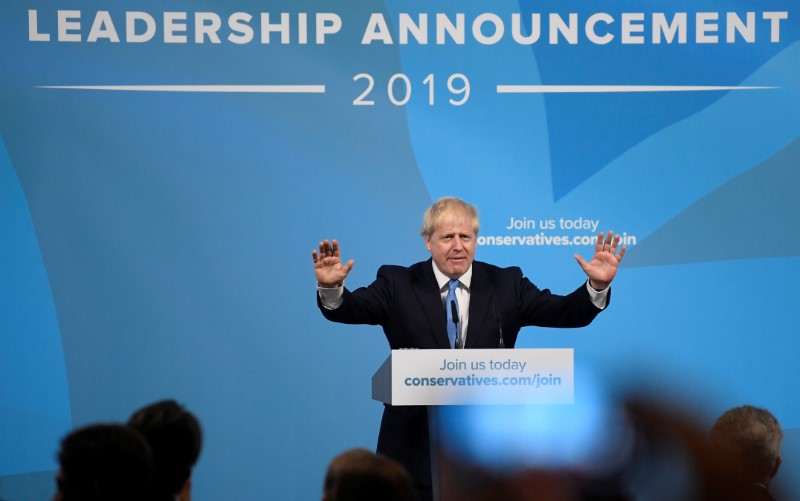By Kylie MacLellan
LONDON (Reuters) - Former foreign minister Boris Johnson was elected leader of Britain's governing Conservative Party on Tuesday, and will take over as prime minister when Theresa May steps down on Wednesday.
With the leadership campaign largely dominated by Brexit, Johnson has set out little in the way of firm policies, but below are some of his positions on key issues:
IRAN:
Johnson has said while the 2015 nuclear deal is looking "increasingly frail" and ways need to be found to constrain Iran's "disruptive behaviour", engaging with the Iranians and seeking to persuade them not to pursue a nuclear weapons programme is the right way forward.
He has so far shown little sign of moving closer to U.S. President Donald Trump's more hardline approach, instead saying he agreed with the position taken by European countries to encourage a return to diplomacy. He has said he would not currently back military action.
"I am not going to pretend that the mullahs of Tehran are easy people to deal with or that they are anything other than a disruptive, dangerous, difficult regime, they certainly are," he said during a leadership debate earlier this month.
"But ... if you asked me whether I think we should now, were I to be prime minister now, would I be supporting military action against Iran? Then the answer is no."
HONG KONG:
As protests erupted in the former British colony earlier this month over a proposed extradition bill, and a war of words ensued between Britain and China, Johnson told Reuters the people of Hong Kong were "within their rights to be very sceptical, very anxious" about the legislation.
"I do support them and I will happily speak up for them and back them every inch of the way. And I would stress to our friends in Beijing that the one country, two systems approach has worked, is working and should not be cast aside," he said.
HUAWEI:
A final decision on whether to include China's Huawei in Britain's 5G telecoms network has been stalled by May stepping down. Johnson has said while there can be significant benefits to investment from other countries, he would not compromise Britain's national security infrastructure.
"You would not expect me as prime minister to do anything to compromise the ability of our fantastic intelligence services to share information as they do, particularly with our five eyes partners, so that is the principle that will guide us."
RELATIONSHIP WITH THE UNITED STATES:
Johnson is keen to maintain a strong relationship with the United States and British media have reported he is considering a visit to meet Trump early in his premiership.
His reluctance to antagonise Trump was evident earlier this month when he failed to defend Britain's ambassador to Washington after diplomatic memos in which Kim Darroch described Trump's administration as "inept" were leaked to a newspaper.
Instead Johnson said he had a good relationship with the White House and it was "very important that we should have a close friendship, a close partnership with the United States".
Johnson has since said Darroch told him the lacklustre support was a factor in his decision to resign.
During a leadership debate, Johnson did criticise Trump for his comments about four congresswomen but declined to describe the remarks as racist.
"If you are the leader of great multi-racial, multi-cultural society you simply cannot use that kind of language about sending people back to where they came from, that went out decades and decades ago and thank heavens for that so it is totally unacceptable," he said.
THE ECONOMY:
Johnson has vowed to spend billions of pounds on public services, infrastructure and tax cuts including promises to increase spending on education, transport, superfast broadband and police and end a public sector pay freeze.
He has said he will tap into the 27 billion pounds of "fiscal headroom" that has built up in the public finances, referring to the difference between the government's target for the budget deficit and its projected size.
"Believe me there is cash now available ... I'm prepared to borrow to finance certain great objectives but overall we will keep fiscal responsibility," he said.
British media have reported he is preparing an emergency budget including aggressive tax cuts, an overhaul of the stamp duty property tax and an assault on regulation if there is a no-deal Brexit.
During Johnson's time as mayor of London he championed financial services but has been trying to rebuild ties with company executives after an expletive against business.
TAX CUTS:
Johnson has said there is room to make tax cuts and has pledged to raise the level at which the higher rate of income tax is paid. He also wants to raise the threshold at which people start to pay National Insurance.
"We should be raising thresholds of income tax – so that we help the huge numbers that have been captured in the higher rate by fiscal drag. We can go for much greater economic growth – and still be the cleanest, greenest society on earth," he said.
He has also said Britain should cut business taxes but has indicated internet giants could be forced to pay more.
"It's deeply unfair that high street businesses are paying tax through the nose ... whereas the internet giants, the FAANGs - Facebook (NASDAQ:FB), Amazon (NASDAQ:AMZN), Netflix (NASDAQ:NFLX) and Google (NASDAQ:GOOGL) - are paying virtually nothing," he said.
